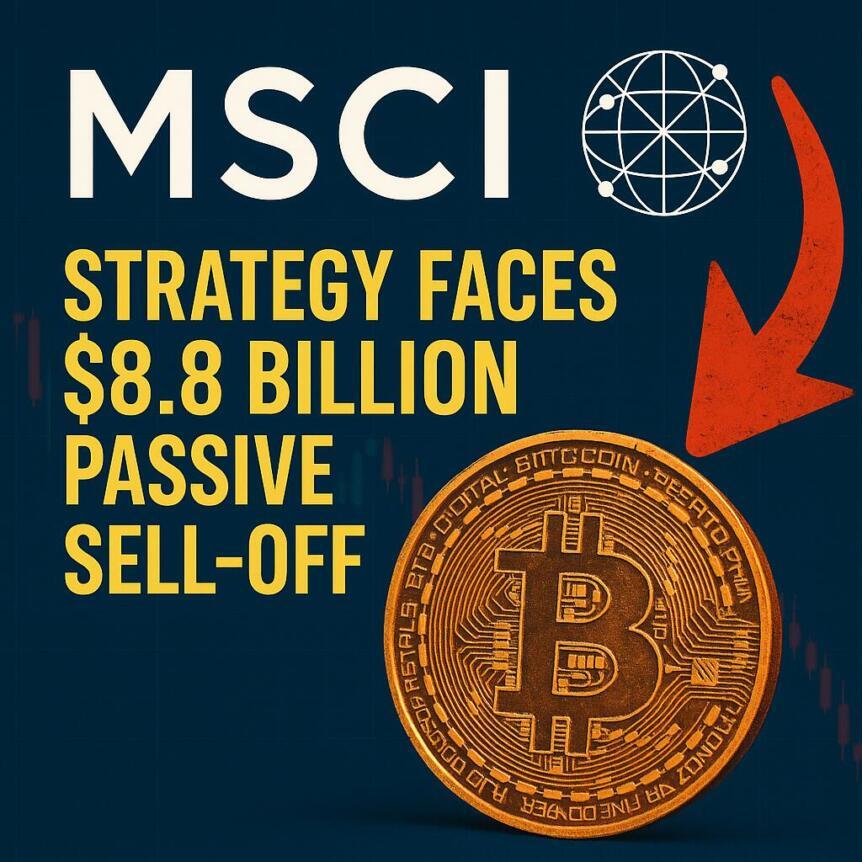
Strategy Faces $8.8 Billion Passive Sell-Off As MSCI Eyes Bitcoin Treasury Ban
With the increasing risk of rejection from major equity indices, JP Morga sees as much as $8.8 billion in forced redemptions from passive funds, which includes around $2.8 billion that is directly linked to the MSCI indices, with the remainder potentially coming if the Nasdaq 100 and other providers follow suit.
$1 Trillion Crypto Wipeout Exposes the Cracks in Saylor's MasterplanStrategy holds 649,870 BTC, purchased at an average price of $74,433 for a total cost basis of $48.37 billion. The company's treasury has generated a 27.8% year-to-date Bitcoin yield through November and an unrealized gain of approximately 15.8% as of mid-month.
The company's market-cap-to-net-asset-value (mNAV) multiple has reduced to around 1.19x, the lowest since the pandemic era, following a general crypto market decline that has erased $1 trillion in total capitalization over the last month.
Shares closed Friday, November 21, 2025, at $170.50 and were last quoted at $172.82 in Sunday trading, down roughly 40% over the past month and 68% from all-time highs.
The Day Strategy Could Lose Billions in Passive MoneyThe risk is believed to be caused by the ongoing MSCI consultation, which is scheduled to close on December 31, 2025. The MSCI consultation proposes reclassifying companies whose cryptocurrency holdings exceed 50% of total assets as“digital asset treasury companies.”
Strategy's Bitcoin treasury currently represents more than 77% of its balance sheet, well above the proposed threshold. A final decision is expected on or around January 15, 2026, with any changes taking effect in February.
Passive vehicles tracking the MSCI USA, Nasdaq 100, and related indices currently hold an estimated $9 billion of Strategy stock. Any forced selling during rebalancing periods would be mechanical and largely price-insensitive, creating a potential feedback loop of downward pressure.
The $8.8 Billion Question Hanging Over Every Bitcoin Treasury StockS&P Global already gives Strategy's debt a junk rating on the basis of concentration risk and volatility. The recent sell-off in the company's preferred shares has also raised the effective cost of future capital raises.
Saylor has defended the treasury strategy as an efficient way to“sell volatility and recycle it back into Bitcoin,” while pointing to the company's software business and AI products as evidence it remains an operating company.
Traders also point out that a continued Bitcoin recovery above $100,000 would likely expand the mNAV premium and reduce exclusion risk. A further 15% decline from current price levels would push the treasury position down close to its $74,433 average acquisition cost.
Crypto Investing Risk WarningCrypto assets are highly volatile. Your capital is at risk. Don't invest unless you're prepared to lose all the money you invest.
Legal Disclaimer:
MENAFN provides the
information “as is” without warranty of any kind. We do not accept
any responsibility or liability for the accuracy, content, images,
videos, licenses, completeness, legality, or reliability of the information
contained in this article. If you have any complaints or copyright
issues related to this article, kindly contact the provider above.


















Comments
No comment